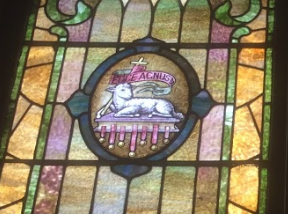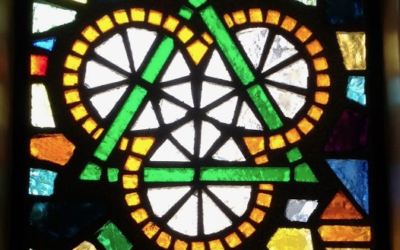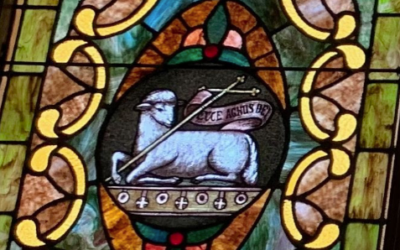The Resurrection Brings Peace
Watch the service
Listen to the sermon
The Resurrection Brings Peace
Read the sermon
The Resurrection Brings Peace
What do you do on your day off? I realize this might not be the time to ask that sort of question, since for some of you, you’re not thinking about resting. Instead, you’re thinking about when you might able to get back to work. But, for a moment, think through the question with me. What do you do on your day off? Do you set aside time for rest, or for fun activities? Like so many questions, the answer for you is probably, “it depends.” If you’re worn out, then what you need first and most is peace and quiet. In the words we look at this morning Jesus has risen from the dead. And what he gives to his disciples is rest and peace. In John 20, we read: “19 On the evening of that first day of the week, when the disciples were together, with the doors locked for fear of the Jewish leaders, Jesus came and stood among them and said, “Peace be with you!” 20 After he said this, he showed them his hands and side. The disciples were overjoyed when they saw the Lord.” (John 20:19–20 NIV11-GKE)
These words are fascinating. For, in these words Jesus has been raised from the dead only a matter of hours. And what is his main concern? It’s not throwing a party. It’s peace. He says, “Peace to you.”1 In fact, it’s so important to Jesus that he says this three times. They have been through a rough week. They have seen their friend, brother, teacher, and Savior tortured, put to death, and then raised from the dead. They need rest. And Jesus gives them rest. But how he gives them rest is fascinating. We read: “21 Again Jesus said, “Peace be with you! As the Father has sent me, I am sending you.” 22 And with that he breathed on them and said, “Receive the Holy Spirit. 23 If you forgive anyone’s sins, their sins are forgiven; if you do not forgive them, they are not forgiven.”” (John 20:21–23 NIV11-GKE)
Jesus gives them rest through the forgiveness of sins. And how amazing this is that he allows sinful, frail Christians to be his messengers and ambassadors to do his work. And what is this work? His work is to use his word to forgive sins. We get to forgive people in Christ’s name and on his behalf. And Jesus attaches a promise to this. He says that when we say that people are forgiven, their sins have been forgiven.2 Now, before we go any further into these words, notice that this use of God’s word to forgive is reactive and responsive. We go to people and show them their sins from God’s word. And as they repent, we tell them that their sins are really, truly forgiven. And what an amazing joy this is. For when a person repents of their sin, we get to tell them that their sins are forgiven. There’s no waiting line. There’s no waiting for the Governor to tell us when we can stop being sheltered in place. We tell that person that his or her sins are forgiven. And Jesus promises that they are.
We get to forgive. But also Jesus tells us that there will be times when we have to refuse to forgive. Jesus tells us that if they do not repent, their sins grip and grasp onto them.3 This is the same word that was used last week when the Marys grasped onto Jesus’ feet. Here it is their sins that still stick and cling to them. And then on Judgment Day they will be punished because of them. Here again is where we remember that how we use God’s word here is responsive and reactive. Since Jesus has forgiven us, we are willing to forgive. But if they do not repent of their sin, then they are the ones who are cutting themselves off from forgiveness. This is so important for us to understand today, since it is so common to say, “don’t judge me.’” Or even worse, they say, “Only God can judge me.”4 And, I suppose, this could be true if people are making unfair judgments about a person. But when, out of love, a person comes to us and shows us our sin so that forgiveness would be ours and we say, “Only God can judge me,” we are denying this part of God’s word where God gives the ability to forgive sins and have them cling to a person to humans.
Here then is where we see our own temptation to sin as Christians, don’t we? God asks us to be messengers and ambassadors. And, on the one hand, there are times when people sin against us. And it doesn’t matter how much a person then repents and shows their repentance, we are tempted to hold onto our grudge. And, on the other hand, when there are people who are close to us, especially family members, there are times God calls on us to expose sin, and instead, we don’t. And that’s why, before we use this forgiveness, we need first to recognize that we have this forgiveness. Jesus has risen from the dead. And right away, what does he do? He gives forgiveness into the hands of his church so that first of all we would know that our sins are forgiven. They are forgiven because, if Jesus is able to rise from the dead, he then is also able to forgive sins both in us and also through us. So first we know that forgiveness is a gift that we have. Then it is a gift we get to use. And finally, what that brings is peace. In Christ’s resurrection we have peace from the fear of death, the threat of punishment in hell. We have peace. But that also is what we get to share. Christ’s resurrection brings peace—peace through forgiveness. But it also brings peace in another way: “24 Now Thomas (also known as Didymus ), one of the Twelve, was not with the disciples when Jesus came. 25 So the other disciples told him, “We have seen the Lord!” But he said to them, “Unless I see the nail marks in his hands and put my finger where the nails were, and put my hand into his side, I will not believe.”” (John 20:24–25 NIV11-GKE)
A week passes. And throughout the week the disciples tell thomas that Jesus has risen. But Thomas says that he won’t believe it. In fact, he says that he will never, ever, ever believe it.5 If, and only if he can see Jesus and touch his wound—then he will believe. There is a problem in this, isn’t there? There is a problem when we put God on the defensive and make him prove himself to us. You see, on the one hand, God has given us our eyes, our feelings, our brains. And he wants us to use them. But when it comes to us and God, all these fail us. They fail us because they were warped and corrupted in the fall into sin. What we see with our eyes can be misleading. What we feel in our hearts cannot always be trusted. And our minds are clouded with doubt and unbelief. That’s why long ago, St. Augustine said, “I believe that I may begin to understand.”6 There is this problem of proof that is there inside of each of us. How do we know—that God is real, that he has risen, that he is my God who forgives me? Notice how Jesus responds to this need for proof: “26 A week later his disciples were in the house again, and Thomas was with them. Though the doors were locked, Jesus came and stood among them and said, “Peace be with you!” 27 Then he said to Thomas, “Put your finger here; see my hands. Reach out your hand and put it into my side. Stop doubting and believe.” 28 Thomas said to him, “My Lord and my God!” 29 Then Jesus told him, “Because you have seen me, you have believed; blessed are those who have not seen and yet have believed.”” (John 20:26–29 NIV11-GKE)
The ones who are blessed are not the ones who see, touch, feel, or fully understand it. The ones who are blessed are the ones who believe. Here too is where we see our temptation to sin. How horrible it is if we conclude that throughout our lives doubt will not lurk in the corners of our mind. How horrible it is if we conclude that we can that we know Jesus is real because we think we have proof—we see him, we feel him, we fully understand him. For what happens when the days of doubt come? What happens when you do not see him, feel him, understand what he is doing in your life and in the world? That’s why these words mean so much to us. Christ’s resurrection brings us peace—peace through the gift of faith. He gives us us this amazing gift of trust in him despite our fears, our doubts, our wandering thoughts. This trust and faith is there alongside our old sinful self, there shining like a star in the darkness. It is there because Jesus says, “blessed are those who have not seen and yet have believed.”” (John 20:29 NIV11-GKE) And through all of that what we receive is peace.
May Christ’s resurrection give you even more what you already have. May he give you forgiveness both to have and then share. May he give you faith that believes even when it cannot see. Amen.
1 “ⲉⲓⲣⲏⲛⲏⲩ̈ⲙⲓⲛ·” (John 20:19 GNT-ALEX)
2 “ⲁⲫⲉⲱⲛⲧⲁⲓⲁⲩⲧⲟⲓⲥ” (John 20:23 GNT-ALEX)
3 “ⲉⲁⲛⲧⲓⲛⲱⲛⲕⲣⲁⲧⲏⲧⲉⲕⲁⲓⲕⲣⲁⲧⲏⲛⲧⲁⲓ·” (John 20:23 GNT-ALEX)
4 “Only God Can Judge Me.”
5 “ⲟⲩⲙⲏⲡⲓⲥⲧⲉⲩⲥⲱ” (John 20:25 GNT-ALEX)
6 Credo ut intellegam
Order of Service
Easter 2
Theme: The Risen Savior gives peace to his disciples by proof of his resurrection
Service Order
Service of the Word page 38
Hymn-165 stanzas 1-4
O Sons and Daughters of the King
Prayer of the Day—Page 39
First Reading—Acts 2:14a, 22-32
Psalm of the Day– 16 Page 68
Pastor sings first part of verse, congregation sings second part of verse and the refrain.
Second Reading –1 Peter 1:3-9
Verse of the Day—Page 40
Gospel – John 20:19-31
Hymn of Day – 165 stanzas 5-9
O Sons and Daughters of the King
Sermon
“The Resurrection Brings Peace”
John 20:19-31
Apostles’ Creed—Page 41
Prayers —Page 42
Blessing—Page 44
Closing Hymn —141
At the Lamb’s High Feast We Sing
Announcements



